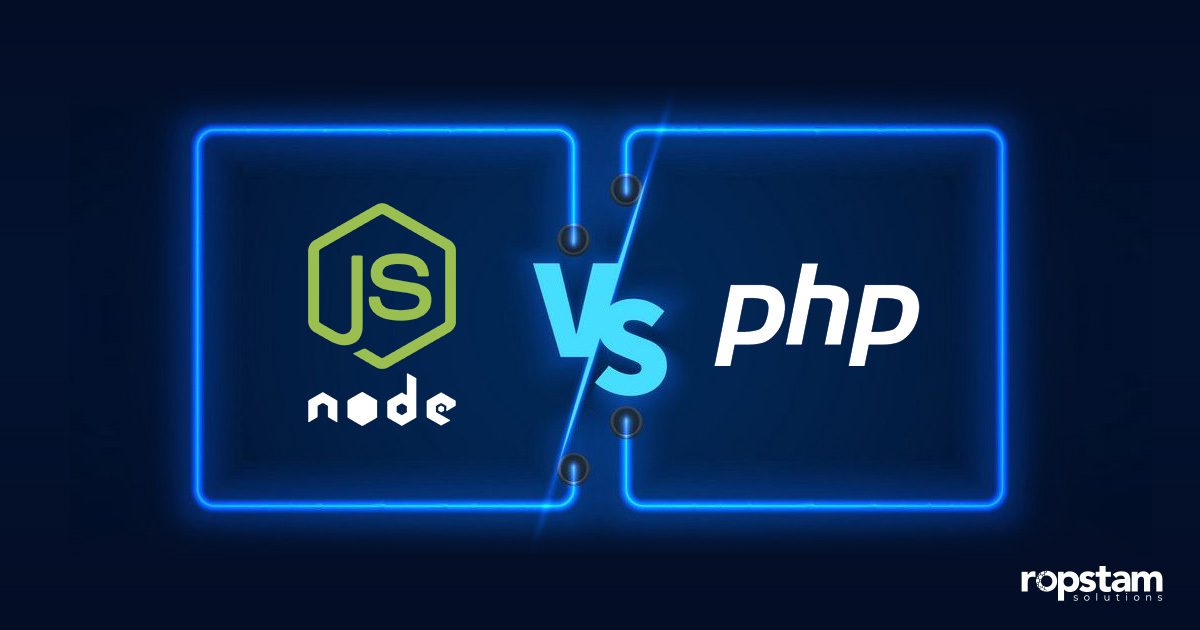Node.js and PHP are two of the most popular development kits for back-end web development. When it comes to choosing a particular environment, the debate still rages on. The developer’s community is split between selecting Node.js or PHP for server-side development. Therefore, it is essential to answer the Node.js vs. PHP question to guide beginners in this field.
While PHP is currently powering more than 78% of the web and has been a dominant back-end language for approximately three decades, Node.js has gained tremendous popularity in a short period of time. Because of its full-stack development capabilities, Node.js has become the go-to choice for many expert developers.
To help the readers choose a particular server-side environment, this blog encompasses the Node.js vs. PHP debate, explaining both development kits in detail with their pros and cons.
What is Node.js?
In simple words, Node.js is a single-threaded, cross-platform runtime environment that leverages JavaScript for both frontend and backend development. Developers choose it for creating fast and scalable real-time applications.
It’s important to note that Node.js was released in 2009 by Ryan Dahl. The Node.js files have “.js” extensions and consist of JavaScript language. Node.js allows developers to build JavaScript-based applications from scratch.
According to a Stack Overflow survey in 2021, 36.19% of full-time developers used Node.js for server-side development. This number is expected to rise in the upcoming years. Some of the features that have given significance to Node.js are Full Stack JS, non-blocking code, simplicity, vast community support, and IoT protocol.
Following are some of the giant companies that utilize Node.js:
- Netflix
- Spotify
- Uber
- Walmart
What is PHP?
PHP, or Hypertext Preprocessor language, is an object-oriented, open-source, server-side scripting language that is primarily used as a web development kit. It was introduced by Rasmus Lerdorf way back in 1994. Even though it is basically a server-side scripting language, PHP developers also utilize it as a general-purpose scripting language.
A recent survey revealed that almost 79% of all websites rely on PHP to some degree. Consequently, PHP is considered one of the most popular programming languages among developers in general and web developers in specific.

To give you an idea of the global acceptance of PHP, the following are some of the popular websites that have utilized this language:
- Wikipedia
- Tumblr
- Slack
- WordPress
Node.js vs. PHP: Factor-Wise Comparison for Backend Development
Now that you have an overview of the Node.js vs. PHP debate and the websites built using Node.js and PHP, it’s time to delve into the factor-wise comparison of both development environments.
In the comparison, we are going to compare both of the language on the basis of the following factors:
- Performance and speed
- Scalability
- Language and syntax
- Server-side rendering
- Frameworks and libraries
- Real-time applications
- Community and support
- Development speed
- Maintenance and debugging
- Hosting options
- Ecosystem and packages
- Learning curve
- Integration with front end
- Error handling
- Use cases
1) Performance and Speed
Node.js, driven by Google’s V8 engine, employs a non-blocking, event-driven architecture, making it highly performant for handling asynchronous operations. PHP, while efficient, tends to excel in traditional synchronous operations. Node.js’ single-threaded event loop can handle high concurrent connections, offering impressive speed.
In short, Node.js is far superior when it comes to performance and speed in terms of managing asynchronous operations. PHP is efficient for traditional web development and can handle a substantial load, but it might not be as performant as Node.js in situations that demand high concurrency and asynchronous processing.
This is perhaps the single most important factor in the Node.js vs. PHP debate.
2) Scalability
Node.js’ event-driven, non-blocking I/O model lends itself well to scalable applications, especially those requiring real-time features. On the other hand, PHP traditionally necessitates additional resources or caching mechanisms to handle large-scale applications. Hence, we can say that Node.js supports scalable applications.
3) Language and Syntax
Node.js employs JavaScript, a widely-used language with a vast developer community. On the other hand, PHP, specifically designed for web development, offers a simpler learning curve for newcomers.
4) Server-Side Rendering
Node.js enables server-side rendering with frameworks like Next.js, aiding SEO and page load times. While PHP can achieve server-side rendering, it may require more configuration and effort. Hence, Node.js is preferred for server-side rendering.
5) Frameworks and Libraries
Node.js offers a range of frameworks like Express and Nest.js, suitable for creating various types of applications. Meanwhile, PHP boasts frameworks like Laravel and Symfony, known for their robustness and feature-rich nature.
6) Real-Time Applications
Node.js excels in real-time applications like chat applications and collaborative tools due to its event-driven architecture. PHP can handle real-time aspects but might require additional components necessitating the allocation of more time and resources.
7) Community and Support
Both Node.js and PHP have vibrant communities, but PHP’s older presence results in a larger collection of resources and libraries. Node.js’ community is rapidly growing due to its popularity, but because PHP has been in the market for much longer, it has a much larger community of developers.
8) Development Speed
Node.js’ single language for both server-side and client-side scripting, JavaScript, accelerates development. PHP’s dedicated syntax and tooling might require slightly more time for developers to become accustomed to. Consequently, Node.js results in faster completion of a commercial website, web app, or a product.
9) Maintenance and Debugging
Node.js’ event-driven model can make debugging complex at times which can be time-consuming, especially for beginners. On the contrary, PHP’s traditional procedural nature offers clearer debugging pathways. Therefore, debugging is much easier when PHP is utilized for server-side development.
10) Hosting Options
It is pertinent to mention that being server-side scripting environments, PHP and Node.js both offer extensive hosting options. However, since PHP has been in the market for more than three decades, it provides more diverse options for hosting providers.
11) Ecosystem and Packages
Node.js leverages the vast npm ecosystem, providing developers with numerous packages and modules. Similarly, PHP has a robust ecosystem centered around Compose.
12) Learning Curve
Node.js’ asynchronous nature might pose a steeper learning curve for developers new to asynchronous programming. PHP’s simpler procedural syntax can be more approachable. This steep learning curve is a major disadvantage for PHP in this Node.js vs PHP debate.
13) Integration with Front-End
Node.js’ unification of JavaScript on both the server and client sides can streamline development and maintain consistency. PHP can integrate with various front-end technologies, but the separation of languages might introduce complexities.
14) Error Handling
PHP is a clear winner here, as error handling is structured properly through exceptions. On the contrary, Node.js’ callback-based error handling can lead to callback hell if not managed properly.
15) Use Cases
Both frameworks excel in different categories. Node.js excels in real-time applications, microservices, and APIs requiring high concurrency. Meanwhile, PHP is well-suited for traditional web applications, content management systems, and e-commerce platforms.
You Might be Interested in Reading: in-depth comparison between PHP and Python.
Node.js vs. PHP: Suitable Applications and Use Cases
Both Node.js and PHP are two widely utilized technologies in the realm of web development, both boasting distinct features that make them suitable for various applications. The following passage will shed light on the use cases of both development environments to help the readers comprehend the Node.js vs. PHP scenario and make an informed decision.
When Should You Use Node.js? – Use Cases
Node.js is renowned for its ability to handle asynchronous operations efficiently. Its event-driven, non-blocking I/O architecture, powered by the V8 JavaScript engine, makes it a preferred choice for developers and applications requiring real-time interactions and high concurrency.
Node.js excels in scenarios like chat applications, online gaming, collaborative tools, and streaming platforms, where multiple connections need to be managed simultaneously without compromising performance. Its lightweight, single-threaded event loop enables seamless handling of numerous requests concurrently, resulting in responsive and scalable applications.
When Should You Use PHP? – Use Cases
PHP, on the other hand, has a longstanding presence in the web development landscape. It follows a more traditional synchronous execution model, which is well-suited for scenarios where processing tasks sequentially suffices. PHP is an excellent choice for building content management systems, e-commerce platforms, blogging websites, and other traditional web applications.
It offers a plethora of frameworks, such as Laravel and Symfony that streamline development and facilitate rapid creation of dynamic websites. PHP’s mature ecosystem, vast community, and widespread hosting options contribute to its enduring popularity.
In practical terms, choosing between Node.js and PHP depends on the nature of the project. If real-time interactivity, concurrent connections, and responsiveness are paramount, Node.js is an ideal choice. Applications involving collaborative features, live updates, and event-driven functionalities thrive in the Node.js environment.
On the other hand, if the project involves building traditional websites, content-driven platforms, or e-commerce portals, PHP’s simplicity, extensive toolset, and compatibility with various databases make it a strong contender.
Node.js vs. PHP: Exploring their Pros and Cons
Now that you are familiar with the applications of Node js and PHP and their overall comparison, let’s dig further into the Node.js vs. PHP debate by evaluating the benefits and pitfalls of both development environments.
PHP Pros
- It has a relatively simple syntax
- It has an extremely large and active community
- It apps can be scaled easily
- It is an open-source language
PHP Cons
- Inherent function names are inconsistent
- Slower development speed
- Not suitable for real-time applications
- It has limited support for multithreading
Advantages of PHP
- Ease of Learning: PHP has a relatively simple syntax, making it accessible for beginners and developers new to programming.
- Large Community: PHP has a vast and active developer community, resulting in abundant resources, tutorials, and support.
- Versatility: PHP can be embedded within HTML, allowing seamless integration with web pages and simplifying dynamic content creation.
- Cross-Platform Compatibility: PHP is compatible with various operating systems and can run on different web servers, enhancing its versatility. Plus, it is easy to update its versions for better work and performance.
- Extensive Frameworks: PHP boasts robust frameworks like Laravel, Symfony, and CodeIgniter, which accelerate development and ensure code maintainability.
- Speed of Development: PHP’s quick development cycle is advantageous for rapidly building web applications and prototypes.
- Scalability: PHP applications can be scaled with relative ease, and it handles well under moderate traffic conditions.
- Open-Source: Being open-source, PHP is cost-effective as developers can freely use and modify the language to suit their needs.
- Database Support: PHP offers support for a wide range of databases, including MySQL, PostgreSQL, and MongoDB.
- Wide Hosting Options: Given that PHP was launched more than 30 years ago, most web hosting services provide PHP support, making deployment and hosting hassle-free.
Disadvantages of PHP
- Inconsistencies in Function Names: PHP’s vast library has inconsistencies in function names and parameter orders, causing confusion for developers.
- Security Concerns: Historically, PHP has faced security issues, partly due to inexperienced developers not following best practices.
- Poor Error Handling: PHP’s error handling system can be less intuitive, making it challenging to identify and resolve issues.
- Lacks Modern Features: While PHP has evolved, it still lacks some modern features found in newer languages like Node.js.
- Limited Support for Multithreading: PHP’s limited support for multithreading makes it less suitable for certain high-performance applications.
- Slower Development Speed: In comparison to newer languages like Node.js, PHP’s performance can be relatively slower, particularly for highly concurrent tasks.
- Global Variables: Overuse of global variables can lead to maintainability challenges and unexpected behavior in PHP applications.
- Limited Type Checking: PHP’s dynamic typing can lead to unexpected type-related issues, which may not be caught during development.
- Less Suitable for Real-Time Applications: PHP’s synchronous nature makes it less suitable for real-time applications requiring high concurrency.
- Lack of Standard Library: PHP’s standard library is less comprehensive than some other languages, which can require more reliance on third-party packages.
Node. js Pros
- The asynchronous nature allows Node.js apps to handle many concurrent connections
- Node.js architecture is ideal for real-time applications
- It boasts a rich library of open-source packages
- It employs JavaScript on both the client and server sides
Node. js Cons
- A single-threaded loop can cause a bottleneck
- Node.js applications have a memory constraint
- Some libraries are still not mature
- Understanding asynchronous programming is a hectic task
Advantages of Node.js
- High Performance: Node.js is renowned for its exceptional speed and performance due to its non-blocking, event-driven architecture.
- Scalability: Its asynchronous nature allows Node.js applications to handle a large number of concurrent connections with ease, making it highly scalable.
- Unified Language: JavaScript is used both on the client and server sides, enabling developers to work seamlessly across the entire stack.
- Vast Ecosystem: Node.js boasts a rich library of open-source packages available through npm (Node Package Manager), allowing developers to integrate functionalities quickly.
- Fast Development: Node.js supports rapid development with its extensive library of pre-built modules, and the flexibility to reuse code between the front and back ends.
- Real-Time Applications: Its event-driven model is ideal for building real-time applications like chat, streaming, and gaming platforms.
- Community and Support: Node.js has a vibrant community that actively contributes to its growth, offering extensive resources and support.
- Cross-Platform: Node.js is cross-platform, meaning applications can be developed and deployed on various operating systems.
- Microservices: Node.js is well-suited for building microservices, allowing developers to create modular and easily maintainable applications.
- Large Talent Pool: Due to its popularity, finding skilled Node.js developers is relatively easier.
Disadvantages of Node.js
- Single-Threaded: Node.js operates on a single-threaded event loop, which can become a bottleneck in CPU-intensive tasks.
- Callback Hell: Managing callbacks for asynchronous operations can lead to nested and complex code structures, known as “callback hell.”
- Lack of Experience: As a relatively newer technology, finding experienced Node.js developers might be challenging in some cases.
- Unstable APIs: Node.js APIs might change frequently between versions, requiring developers to update their codebase and modify the web application.
- Limited Support for CPU-Intensive Tasks: Node.js might not be the best choice for applications heavily reliant on CPU-bound processing.
- Steep Learning Curve: Asynchronous programming and understanding event-driven concepts can be challenging for developers new to the technology.
- Limited Memory Capacity: Node.js applications have a memory limit, which can be a constraint for certain memory-intensive tasks.
- Immature Libraries: Some libraries and modules might be less mature compared to those available in other languages and ecosystems.
- Not Suitable for Long-Running Tasks: Node.js might not be the best choice for tasks that require continuous, long-running processes.
- Security Concerns: Vulnerabilities in third-party modules and the fast-paced development cycle of Node.js can pose security challenges.
Node.js vs. PHP: The Final Verdict
Both Node.js and PHP are used for server-side scripting and have identical purposes leading to fierce competition among the developers. The aim of this article was to help the readers identify a suitable development kit for back-end web development by digging into the Node.js vs. PHP question. Node.js is the ideal choice if you want real-time connectivity, responsiveness, and event-driven features. Choose PHP if you are dealing with a traditional website, extensive toolset, and content-driven platforms.
At Ropstam Solutions, we have a talented team of web developers working around the clock to deliver quality products. Over the past 10 years, we have ensured the deployment of several websites and web applications, leaving clients satisfied with our work. If you want to avail of our web development services for your business, contact us now.













